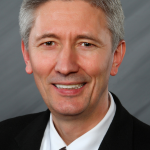‘Healed by an Angel’ series opens: Meet Becky as her journey with cancer begins


Dr. Michael Porubcin
EDITOR’S NOTE: This is the first in a three-part series written by Dr. Michael Porubcin, a member of St. Ambrose Parish in Milan. Dr. Porubcin is a hematologist and oncologist who serves as vice president of the St. Thomas Aquinas Guild of the Quad Cities, a chartered guild of the Catholic Medical Association. Becky, the subject of the series, lives in Milan.
—
I first met Becky in June of 2004. She was 42, a happily married third-grade teacher raising an 18-year-old daughter. She was referred to me by the university surgeon for further management of “advanced cancer.”
Becky’s journey started about two years before we met, when she noticed a painless lump just above her left knee. Biopsy revealed this to be an aggressive sarcoma called malignant fibrous histiocytoma, a rare soft tissue cancer. Becky could not recall any possible causes of this condition, including previous leg injury, or past exposure to radiation, chemotherapy, and common herbicides. Her sister was diagnosed with breast cancer at age 51, but there appeared to be no family predisposition to sarcoma. Besides having a benign heart murmur since childhood, Becky was in great health.

I was struck by Becky’s cheerful attitude, a rare phenomenon in my line of work, especially when seeing younger people with advanced cancer.
By the time Becky underwent her first leg surgery, her tumor had grown to the size of a small grapefruit. Despite doctors’ best efforts to save her leg with aggressive surgery and radiation therapy, the cancer returned in a little over a year. The final decision was agonizing: it would be her leg or her life. Becky was only 41, with the best of her life still ahead of her. How does one make such a choice at any age?
As events unfolded, losing her leg was not the only bad news waiting for Becky. Just one day prior to surgery, she learned that the cancer had already spread to her lung. The chance for a cure was slipping away. Her doctor’s recommendation was somewhat counterintuitive: she was to proceed with above-the-knee amputation and subsequent surgical removal of her lung tumor. This advice was based on solid clinical evidence suggesting significant long-term survival improvement of sarcoma patients upon successful removal of their lung metastases.
DEVASTATING NEWS, THEN NEW HOPE
Becky came to see me a little over a month later — a one-leg amputee in a wheelchair with chest scars from recent lung surgery. At that time, she was still undergoing a great deal of “phantom pain,” only partially managed with medications. She would experience intermittent episodes of severe burning pain, alternating with an intense itching feeling in a leg that was no longer there.
Despite all of that, I was struck by her cheerful attitude, a rare phenomenon in my line of work, especially when seeing younger people with advanced cancer. Remaining somber, I brought up additional treatment options. She listened attentively, but her first question was how soon she could start using her new prosthetic leg. The side effects of chemotherapy did not concern her a bit. She was already planning on doing what she loved most — getting back in the classroom. We settled on physical therapy and regular follow-up CAT scans.
Unfortunately, within a few months, Becky was diagnosed with multiple new tumors in both lungs. This was devastating news. It meant she could only have 12 to 19 months to live.
After thorough discussion and consultations, Becky decided to proceed with aggressive chemotherapy. Should there be a good response to treatment, the plan was to go for surgical removal of all remaining metastases. Becky’s first line chemotherapy started shortly before Christmas. She became a regular “guest” in our infusion suite for a full four months, always pleasant, faithfully accompanied by her beloved husband. Treatment was no walk in the park. Beside early hair loss, Becky also suffered substantial fatigue, appetite loss, and intermittent nausea, most pronounced during the first week of each treatment cycle. Nevertheless, she remained positive and continued to teach, working half days every third week of therapy.
With minor dose modification toward the end, Becky was able to complete all six planned treatments on time. It was not until a few weeks after Easter 2005 when we celebrated her near complete response to therapy. All her lung lesions had shrunk, her hair was growing back, and she had returned to the classroom full time. We all were hopeful once again.
HEARTBREAK AS DISEASE “EXPLODES”
Four short months had passed since this exciting news when Becky hit another wall. A repeat CAT scan revealed yet again, the lung tumors had come back. The surgeon that Becky saw at the University of Iowa was candid but still somewhat hopeful. His recommendation was to go ahead with “potentially” curative surgery. This time, the price would not be her limb but rather the larger part of her lungs. Like before, Becky listened carefully, asking all pertinent questions and eventually deciding to proceed with surgery. A total of five malignant tumors and one third of her right lung were removed in September 2005.
What followed was simply heartbreaking. In June 2006, just nine months after her life-saving surgery, Becky discovered a painless, peanut-sized lump on the back of her head. Her surgeon expected it to be a benign cyst, but the excisional biopsy confirmed that her sarcoma was back, this time in a no doubt incurable fashion. A subsequent CAT scan confirmed an “explosion” of her disease. She was found to have a four-inch mass in her right lung, two new nodules in the left lung, and two soft tissue tumors, including one in her right lower back. Becky’s shortness of breath and pain had significantly worsened. She was forced to sleep in a recliner due to the pain from her back tumor, requiring strong pain medications on a regular basis.
Becky had hit rock bottom.
NEXT ISSUE: Becky’s incredible experience.





